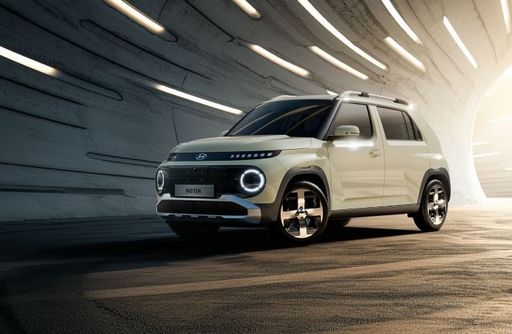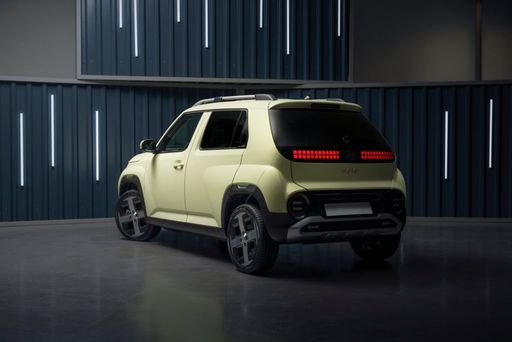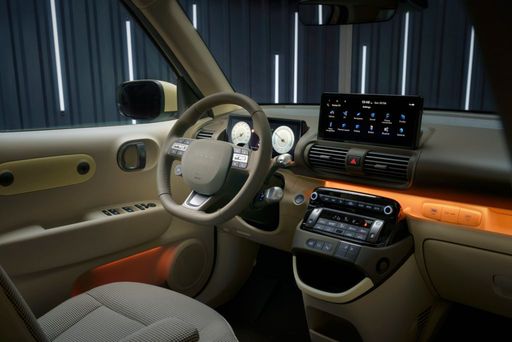Toyota Yaris Cross vs Hyundai Inster - Differences and prices compared
Costs and Efficiency:
Price and efficiency are often the first things buyers look at. Here it becomes clear which model has the long-term edge – whether at the pump, the plug, or in purchase price.
Hyundai Inster has a slightly advantage in terms of price – it starts at 20500 £, while the Toyota Yaris Cross costs 23700 £. That’s a price difference of around 3206 £.
Engine and Performance:
Power, torque and acceleration say a lot about how a car feels on the road. This is where you see which model delivers more driving dynamics.
When it comes to engine power, the Toyota Yaris Cross has a slightly edge – offering 130 HP compared to 115 HP. That’s roughly 15 HP more horsepower.
In acceleration from 0 to 100 km/h, the Hyundai Inster is hardly perceptible quicker – completing the sprint in 10.60 s, while the Toyota Yaris Cross takes 10.70 s. That’s about 0.10 s faster.
In terms of top speed, the Toyota Yaris Cross performs slightly better – reaching 170 km/h, while the Hyundai Inster tops out at 150 km/h. The difference is around 20 km/h.
Space and Everyday Use:
Beyond pure performance, interior space and usability matter most in daily life. This is where you see which car is more practical and versatile.
Seats: Toyota Yaris Cross offers somewhat more seating capacity – 5 vs 4.
In curb weight, Toyota Yaris Cross is slightly lighter – 1180 kg compared to 1380 kg. The difference is around 200 kg.
In terms of boot space, the Toyota Yaris Cross offers evident more room – 397 L compared to 280 L. That’s a difference of about 117 L.
In maximum load capacity, the Toyota Yaris Cross performs minimal better – up to 1097 L, which is about 38 L more than the Hyundai Inster.
When it comes to payload, Toyota Yaris Cross noticeable takes the win – 510 kg compared to 357 kg. That’s a difference of about 153 kg.
Who comes out on top?
Overall, the Toyota Yaris Cross shows itself to be edges out slightly and secures the title of DriveDuel Champion.
It convinces with the more balanced overall package and proves to be the more versatile choice for everyday use.
 @ Toyota Motor Corporation
@ Toyota Motor Corporation
Toyota Yaris Cross
Costs and Consumption
View detailed analysis
Engine and Performance
View detailed analysis
Dimensions and Body
View detailed analysis
Toyota Yaris Cross
The Toyota Yaris Cross takes the jaunty personality of the Yaris and gives it a taller stance and a bit more practicality, so you get city-friendly agility with added SUV presence. It’s easy to live with, economical on the daily grind, and smartly packaged — a sensible pick for buyers who want fuss-free transport with a touch of character.
details @ Toyota Motor Corporation
@ Toyota Motor Corporation
 @ Toyota Motor Corporation
@ Toyota Motor Corporation
 @ Toyota Motor Corporation
@ Toyota Motor Corporation
 @ Toyota Motor Corporation
@ Toyota Motor Corporation
 @ Toyota Motor Corporation
@ Toyota Motor Corporation
 @ Toyota Motor Corporation
@ Toyota Motor Corporation
 @ Toyota Motor Corporation
@ Toyota Motor Corporation
Hyundai Inster
The Inster has quickly captured the attention of automotive enthusiasts with its striking design and dynamic performance. This model seamlessly blends advanced technology with comfort, making it an ideal choice for both daily commutes and adventurous road trips. With its spacious interior and innovative features, the Inster promises an exhilarating driving experience that doesn’t compromise on practicality.
details @ Hyundai Motor Company
@ Hyundai Motor Company
 @ Hyundai Motor Company
@ Hyundai Motor Company
 @ Hyundai Motor Company
@ Hyundai Motor Company
 @ Toyota Motor Corporation
@ Toyota Motor Corporation
|
 @ Hyundai Motor Company
@ Hyundai Motor Company
|
|
|
|
Costs and Consumption |
|
|---|---|
|
Price
23700 - 34300 £
|
Price
20500 - 25800 £
|
|
Consumption L/100km
4.5 - 4.8 L
|
Consumption L/100km
-
|
|
Consumption kWh/100km
-
|
Consumption kWh/100km
14.3 - 15.1 kWh
|
|
Electric Range
-
|
Electric Range
327 - 370 km
|
|
Battery Capacity
-
|
Battery Capacity
42 - 49 kWh
|
|
co2
101 - 108 g/km
|
co2
0 g/km
|
|
Fuel tank capacity
36 L
|
Fuel tank capacity
-
|
Dimensions and Body |
|
|---|---|
|
Body Type
SUV
|
Body Type
SUV
|
|
Seats
5
|
Seats
4
|
|
Doors
5
|
Doors
5
|
|
Curb weight
1180 - 1290 kg
|
Curb weight
1380 - 1433 kg
|
|
Trunk capacity
320 - 397 L
|
Trunk capacity
238 - 280 L
|
|
Length
4180 mm
|
Length
3825 - 3845 mm
|
|
Width
1765 mm
|
Width
1610 mm
|
|
Height
1595 mm
|
Height
1575 - 1610 mm
|
|
Max trunk capacity
1097 L
|
Max trunk capacity
1059 L
|
|
Payload
485 - 510 kg
|
Payload
317 - 357 kg
|
Engine and Performance |
|
|---|---|
|
Engine Type
Full Hybrid
|
Engine Type
Electric
|
|
Transmission
Automatic
|
Transmission
Automatic
|
|
Transmission Detail
CVT
|
Transmission Detail
Reduction Gearbox
|
|
Drive Type
Front-Wheel Drive, All-Wheel Drive
|
Drive Type
Front-Wheel Drive
|
|
Power HP
116 - 130 HP
|
Power HP
97 - 115 HP
|
|
Acceleration 0-100km/h
10.7 - 11.3 s
|
Acceleration 0-100km/h
10.6 - 11.7 s
|
|
Max Speed
170 km/h
|
Max Speed
140 - 150 km/h
|
|
Torque
-
|
Torque
147 Nm
|
|
Number of Cylinders
3
|
Number of Cylinders
-
|
|
Power kW
85 - 96 kW
|
Power kW
71 - 85 kW
|
|
Engine capacity
1490 cm3
|
Engine capacity
-
|
General |
|
|---|---|
|
Model Year
2024 - 2025
|
Model Year
2025
|
|
CO2 Efficiency Class
C
|
CO2 Efficiency Class
A
|
|
Brand
Toyota
|
Brand
Hyundai
|
Is the Toyota Yaris Cross offered with different drivetrains?
Available configurations include Front-Wheel Drive or All-Wheel Drive.
The prices and data displayed are estimates based on German list prices and may vary by country. This information is not legally binding.
